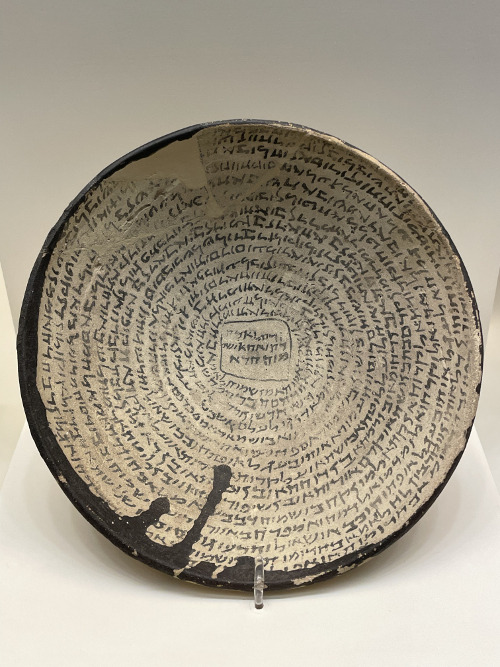#Aramae
Text
We don’t talk enough about how Lucifer definitely doesn’t shut up during sex. And I don’t just mean grunts/whines/noises, I mean he rambles and chatters up a storm about how good you feel and how good you’re doing while he’s rawing you. He will call you every pet name in the book and has, at certain points, spoken in languages you’ve never even heard of to try and describe how amazing making love with you is.
#lucifer x reader#lucifer morningstar#hazbin hotel#You have to stop him at one point when he starts jabbering in Aramaic#hazbin lucifer#you have an emergency ball gag in your bedside drawer if you’re just not in the mood#but usually it’s hot and adorable
180 notes
·
View notes
Note
Jewish culture is wanting to learn Hebrew to do the prayers and speak with Israelis but also wanting to learn Yiddish because that's the language of (at least my) ancestors and somehow wanting to do both, but knowing it's a bad idea to split my attention. But wouldn't it be cool to be able to read Sholem Aleichem's work in the original language, but also Judeo-Aramaic and Ladino seem like cool languages and maybe I could somehow learn all the Jewish languages all at once—
.
#jewish#judaism#jewish culture is#jumblr#hebrew#yiddish#ladino#judeo-aramaic#still-searching-for-something
105 notes
·
View notes
Text
another mena language post - i wanted to talk about judeo-arabic and clarify a little bit about what "judeo-arabic" means
the basics, for those of you who don't know: arabic, being a language that was spread over a large part of the world and has since evolved into many different forms, has many different things that differentiate certain dialects. languages/dialects can be influenced by languages speakers' ancestors spoke before, by the social structure of where speakers live, by languages they come into contact with, and by gradual evolution in pronunciation. (many letters like evolving into ones that are easier to pronounce - this is why arabic has no "p" sound, it eventually evolved into "f" or "b". the same thing happened in germanic languages to some extent, which is why we say "father" in english and "vader" in german while in romance languages it's some variation of "padre" or "père".) many arabic dialects in particular possess different substratum (obvious, traceable influence from languages people spoke in before shifting to the new one).
arabic, being a language that was spread over a large part of the world and has since evolved into many different forms, has many different regional dialects which are different for the reasons i described in the above paragraph. even though there's modern standard arabic (which is the subject of its own post), people speak regional dialects in real life. on top of that, there's a variety of social influences on different types of arabic, such as whether someone's living in the city or in the country, whether someone's sedentary or a bedouin, and in some cases religion.
in the middle east, religion was historically:
not seen as a personal choice, but as something you're born into and a group you're a part of, kind of like ethnicity;
not generally something governments actively wanted everyone to share one of at the penalty of ostracization due to sticking to your group being the more livable way of life in the area, or later, the benefits of things like imposing extra taxes on people who weren't the "correct" religion/branch (this is far from being a "muslim thing" btw, it's been in the area for a while now, i mean look at the assyrians);
an influential factor in where you lived and who you were more likely to interact with because of those two things. (for example, it wasn't uncommon for most of the people living in one village in the countryside to share one religion/branch of a religion. if your village converted, you converted, too. if they didn't, you didn't, either.)
this means that the influence of religion in different types of arabic is due to people of different religions living in or coming from different places, and who people talked to most often.
for example, in bahrain, most sedentary shia bahrainis' ancestors have lived on the island for a very long time, while most sedentary sunni bahrainis' ancestors immigrated from other places in the gulf and iran in the 18th century. therefore, while they've all interacted and shared different aspects of their dialects including loanwords, there are two "types" of bahraini arabic considered distinctive to sunni and shia bahrainis respectively, regardless of how long ago their ancestors got there. despite the differences being marked by the religion of the speakers, they have nothing to do with religion or contact/lack thereof between bahraini sunni and shia, but with the factors affecting the different dialects i mentioned in the first paragraph which influenced either group.
a similar phenomenon to this in english is class differences in accent in england. nothing in received pronunciation is actually something only rich people can say or unintelligible to poor people, it developed by the class differences influencing where rich and poor english people lived and the different pronunciation/linguistic histories in those places, as well with different classes keeping more to themselves.
the influence of religion on arabic dialects isn't universal and nowhere near as intense as it is with aramaic. some places, especially more cosmopolitan or densely populated places, are less likely to have very noticeable differences or any differences at all. in addition, certain variations of a dialects that may've been influenced by religion in some way (as well as urban dialects) may be standardized through tv/movies/social media or through generally being seen as more "prestigious", making more people who wouldn't have spoken them otherwise more likely to pick it up. (this is why so many arabic speakers can understand egyptian arabic - cairo is like the hollywood of the arabic-speaking world.) this is the case with many if not most countries' official and regional languages/dialects nowadays.
this phenomenon is what "judeo-arabic" refers to generally. like many other jewish diaspora languages, the "jewish" aspect is that it was a specific thing jewish people did to different types of arabic, not that it was isolated, possessed a large enough amount of certain loanwords (though some varieties did have them), or is unintelligible to non-jews. people were generally aware of differences where they existed and navigated between them. (for example, baghdadi jews may've switched to the more prestigious muslim baghdadi dialect when in public.) if you know arabic, listen to this guy speak, you should be able to understand him just fine.
judeo-arabic also often used the hebrew alphabet and some may have been influenced by hebrew syntax and grammar in their spelling. you can also see the use of script for religious identification in persian and urdu using the arabic script, and in english using the latin alphabet. in general, influences of hebrew/aramaic on different types of judeo-arabic aren't consistent. you can read more about that here.
"judeo-arabic" isn't a universal that definitely happened in every arabic-speaking part of the world that had jews in it to the same degrees, but it did definitely exist. some examples:
after the siege of baghdad in 1258, where mongols killed all muslim baghdadis and spared baghdadis of other religions, bedouins from the south gradually resettled the city. this means that the "standard" sedentary dialect in the south is notably bedouin influenced, while dialects in the north are more notably influenced by eastern aramaic. christians and (when they lived there) jews in baghdad have dialects closer to what’s up north. within those, there's specific loans and quirks marking the differences between "christian" and "jewish".
yemenite jews faced some of the most persistent antisemitic persecution in the middle east, so yemeni jewish arabic was more of a city thing and often in the form of passwords/codewords to keep jews safe. jews were usually a lot safer and better-regarded in the countryside, so jewish yemeni arabic was much less of a thing there, and when it was, it was less "serious".
due to the long history of maghrebi immigration to palestine, there's attestation of maghrebi influences in arabic spoken by some palestinian jews with that origin. this was also a thing in cairo to some extent.
(i'd link sources, but most of them are in hebrew, i guess you'll have to trust me on this one??)
still, the phrase "judeo-arabic" is often used with the implication that it was one all encompassing thing (which it wasn't, as you can see), or that jews everywhere had it in some way. many jews who spoke some version of arabic special to their mostly-jewish locale may not have registered it as a specifically "jewish" version of arabic (though they did more often than not). the truth is that research about anything related to middle eastern and north african jews is often sloppy, nonexistent, and often motivated by the desire of the researcher to prove something about israel's colonization of palestine (on either "side" of the issue). this is not me being a centrist about the colonization of palestine, this is me stating that academia is often (even usually) influenced by factors that aren't getting the best and most accurate information about something. i don't think we're going to get anything really "objective" on arabic spoken by jews in that regard for a long while.
for comparison's sake: yiddish is considered a separate language from german due to 19th century yiddishists' efforts to "evolve" yiddish from dialect to language (yiddish-speaking jews were said to speak "corrupted german" historically; on that note sephardim were also said to speak "corrupted spanish"). this was at a time when ethnic nationalism was en vogue in europe and declaring a national language meant declaring your status as a sovereign nation (both metaphorically and literally). for yiddishists to assert that they were speaking a language and not a dialect that intrinsically tied them to germans was to reject the discrimination that they were facing. (besides, german/austrian/swiss jews weren't speaking yiddish (leaving it with the connotation of being the language of those icky ostjuden), yiddish-speaking jews had practically zero other ties to germany/austria/switzerland, and yiddish-speaking jews (let alone the yiddishists) were almost entirely east of germany/austria/switzerland, so it's not like they were pulling this out of their ass.)
whether a jewish person of arabic-speaking descent calls it "arabic", "judeo-arabic", or something like "moroccan"/"syrian"/etc depends on who you're talking to, where they're from (both diaspora origins and today), how old they are, and what they think about zionism. despite "judeo-arabic" being what it's called in academia, on the ground, there's no real strong consensus either way because the social circumstances arabic-speaking jews lived in didn't drive them to form a movement similar to yiddishists. (not because there was no discrimination, but because the political/social/linguistic circumstances were different.) the occupation since made the subject of middle eastern jews’ relation to the middle east a contentious topic considering the political and personal weight behind certain cultural identifiers. the term "judeo-arabic" is modern in comparison - whether it's a distinction dredged up by zionist academics to create separations that didn't really exist or a generally accurate term for a specific linguistic phenomenon is a decision i'll leave you to make.
#jewish#mizrahi#languageposting#my posts#my own opinion is it doesn’t matter what you label a language because it doesn’t erase its history#what we think of as a ''language'' or ''dialect'' is arbitrary#technically hebrew arabic and aramaic are all dialects of proto-semitic#but it’s a good general idea to listen to speakers to know why someone may think of it in the way that they do#like yeah i do think political circumstances cause bosnians/serbians/croatians to label the language they speak as separate things despite#them all speaking one thing. but if a croatian guy tells me he speaks croatian and it has nothing to do with bosnian or serbian i won’t be#like ‘’well actually it’s a dialect continuum’’ or ‘’you poor thing manipulated by nationalist propaganda’’#ill just smile and nod and move on#he has a god given right to see the language he uses every day however he wants#even if i came to my opinion through research and the concensus of other bosnians/serbs/croats it means nothing in comparison
143 notes
·
View notes
Text
Wait until these kids in the watermelon gang discover that Aramaic is older than Arabic.
#israel#am yisrael chai#jumblr#Aramaic#Arabic#first century#palestine#watermelon brigade#arm chair warriors
201 notes
·
View notes
Text

84 notes
·
View notes
Text
Ego quoque twink eram - I too was a twink


Look ye here @ennonymous-twink
#aziraphale#angel of the eastern gate#good omens#michael sheen#latin because my aramaic sucks and because it sounds twinky
106 notes
·
View notes
Text




i made new aranara pins and melusine charms ✨
(they're available in my store now if you're interested 🥺)
also ‼️please read below for important shop/boothing updates✨
Hello everyone, I'm excited to update that Melusine wooden charms and Aranara wooden pin blindbags are now available in my shop!! 🤲✨️
Here are the options available:
- 1 blindbag (random)
- 3 random + 1 choice (please specify your choice in the 'notes' section)
- Full set (discounted)
For aranaras only:
- Set of 8 new designs for those who previously ordered a set of 4 of my earlier design
Singapore friends/followers, please note that I will not be boothing in any events until 21 December 2024 (EOY). However, I'm offering local prices with flat fee of $2 for tracked shipping, payable via PayNow/PayLah!! If you'd like to choose this option, please send me a DM listing your desired items, and I'll provide further details. The blindbags are SGD 4 each; please refer to my previous catalogues for other prices.
Last update: My shop will be closing on 12 August 2024, so please place your orders before then to avoid disappointment ❤️
Thank you all for your support! It's always an honour and blessing to receive orders, and I'm glad that my art can bring you happiness. 🥹💖
#aranara#melusine#aeval#elynas#genshin impact#sedene#mamere#pahsiv#elphane#arama#ararycan#arana#araja
63 notes
·
View notes
Text

Dinanukht, from Persian ‘the one who speaks in accordance with the religion’) is a mythological character in the Ginza Rabba, one of the main religious scriptures of Mandaeism, who is portrayed as an anthropomorphic book, a half-man, half-book, who “sits by the waters between the worlds, reading himself.”
#mandaeism#mandaean#mandaic#gnostic#gnosticism#aramaic#persian#book art#illustration#michael kirkbride#morrowind#demon#demonology
62 notes
·
View notes
Text

OH SHIT THAT'S HEBREW
it's a reference to the bible ofc where, if you go through the cultural context and such you get "god, god, why have you forsaken me?" (which is. apparently jesus' last words askjdfgfh shoutout the person in the notes who pointed it out 🫡)
[btw, direct translation is more like. "my god, my god, why did you cause me (this) trouble?", but i'm fairly certain it's supposed to be the jesus thing given fyodor's whole Thing]
#i am so excited. it took me a second to process what i'm seeing+hearing until i heard the כ sound omg#bsd spoilers#dan watches bsd#also gonna tag this as#bsd fyodor#so more people can see :D#edit: corrected some stuff and added more info i didn't know :)#the last word is a mix of hebrew and aramaic too! i had to do some googling for that lol
287 notes
·
View notes
Text




Genshin Impact | 4.6 Quest Avatars (3/5)
Download Link (Google Drive)
#genshin impact#npc icons#arama#aranara#jeht#benben#liloupar#sorush#pngs#sumeru#companion avatars#companion avatars: NPC edition
88 notes
·
View notes
Text
__Bazen
__Geri
__Adım atmak da__
İlerlemektir__!!
💙🥀🕊️🦋🐞💙

İyiyi ara,
doğruyu ara,
güzeli ara
fakat kusuru arama...!

69 notes
·
View notes
Photo

Never Seen: The Trace of a Jewish Spirit from Mesopotamia
The Story Begins from a Dead End
August 25, 2015 was a very hot day of summer but its omen was a very promising one! That day, I was with my friend, Mr. Hashim Hama Abdulla, director of the Sulaymaniyah Museum in Iraq, walking in the main hall of the Museum. So far, I had visited the museum innumerable times. I pointed towards something on the floor, which I had noticed on several occasions but I had never inquired about.
The upper surface of the so-called "Gopala Rock", inscribed with five lines, thought to be Aramaic. On the upper right margin, a single separate line of inscription also appear.
There was a rock, which was displayed on the floor directly, without any description. It was relatively dirty, strange, and irregular in shape and was inscribed with what appeared to be an ancient language. It was abutting the wall besides one of the large wood display cases. I'm sure, you can easily by-pass and miss it if you visit that hall. Nothing is striking or interesting about it, in addition to being placed in a non-attractive hidden space. “What is this? I forgot to ask you many times Kak (brother) Hashim?” These were the opening remarks of mine to Mr. Hashim. “It is a long story and we are waiting the results of the transliteration of these Aramaic or maybe Hebrew inscriptions”, Mr. Hashim replied. “It was found at the village near Bazian in late 1970s”. This was the last information I got from him that day.
Continue reading...
44 notes
·
View notes
Text
i have to say i haven't stopped thinking about how wayhaven handles the detective's knowledge of non-english languages.
"how good are you at languages"
"yes"
#i know it would be a pain in the ass to ask for every language that comes up bit#gonna ask my linguist friend if she would recognize old aramaic if she heard it
290 notes
·
View notes
Photo

Near Eastern magic bowl with Aramaic inscriptions. The clay incantation bowl is a form of early protective magic found in Persia and Mesopotamia. National Archaeological Museum, Athens, GREECE.
Photo by Babylon Chronicle
965 notes
·
View notes
Text
Edwin Paine provokes such gender envy you have no idea.
#like fuck the clothes the hair the self-control the sassiness#the fact he reads aramaic#and has this 30 year old committed devoted loving friendship#if he wasn't constantly tortured I'd be jealous#EDIT was so passionate about this statement i forgot to tag the fandom#edwin paine#dead boy detectives
30 notes
·
View notes
Text

I finished the Sumeru world quest featuring all the Aranara and it made me feel things man,,, I love those silly cabbage critters<3
#my stuff#genshin traveler#genshin fanart#genshin impact#genshin impact fanart#fanart#genshin aether#my art#genshin arama#Genshin sumeru
38 notes
·
View notes